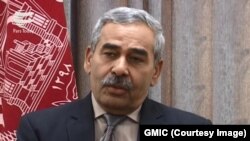The Afghan Ministry of Defense said current combat operations are limited to self-defense and protecting civilians against attacks by the Taliban and other groups.
General Mohammad Radmanish, a spokesperson for the Afghan Defense Minister, told VOA that Afghan security forces are abiding by the current cease-fire.
"We also have instructions to take actions against those who intend to engage in activities that violate the armistice, or try to harm the armed forces or civilians," Radmanish added.
Afghanistan consists of 34 provinces. Security and defense forces are currently fighting against the Taliban in at least eight of them, the Afghan Defense Ministry statement said.
In central Wardak and northern Kunduz provinces, Taliban insurgents have overrun a dozen security checkposts since Friday.
Breaching the armistice
Despite being engaged in firefights, the Afghan government insists that it has not breached the unilateral cease-fire, and said defensive actions will be taken only when needed.
"The Afghan government is fully committed to the cease-fire. However, if being attacked, we will forcefully strike back and defend ourselves," Shah Hussain Murtazawi, a spokesperson for the Afghan president, told VOA.
The cease-fire is carrying some signs of hope, U.S. Secretary of Defense Jim Mattis told reporters Sunday.
"Clearly, [Afghan President Ashraf] Ghani has hit a responsive chord for not just the Afghan national government side, it also cut deep into the Taliban," Mattis said.
Cease-fire rejected
On Monday, the Taliban once again rejected the call for an extension of the armistice.
The call for the cease-fire this time came from a group of Afghan elders and activists who marched for nearly 40 days on foot from southern Helmand province to the capital city of Kabul, urging warring sides in Afghanistan for peace talks.
After reaching Kabul, the peace activists said they were giving the Taliban three days to extend the cease-fire following a pledge from the Afghan president for a month-long conditional armistice.
In a meeting last week with the activists, Ghani promised to extend the cease-fire if the Taliban respond positively. In a statement Monday, Zabihullah Mujahid, a Taliban spokesperson, rejected the extension and called the peace march "an American plot under the peace title."
The peace activists staged a sit-in outside the United Nations Assistance Mission Afghanistan (UNAMA) office in Kabul, demanding that the U.N. pressure its members whose troops are part of the international forces fighting in Afghanistan to help bring peace and stability to the county.
UNAMA welcomed their demand.
"U.N. in Afghanistan committed to support Afghan peoples' will for the extension of a cease-fire and the beginning of Afghan-led, Afghan-owned peace talks to end the war," a UNAMA statement said. The sit-in outside the U.N. office will last three days.
"We will also stage a sit-in outside the embassies of Iran, Pakistan, Russia and the United States," Bismillah Watandost, a peace march spokesperson, told VOA.
The activists want these countries, including Afghanistan's next-door neighbors Iran and Pakistan, to play a role in bringing peace to the country.






